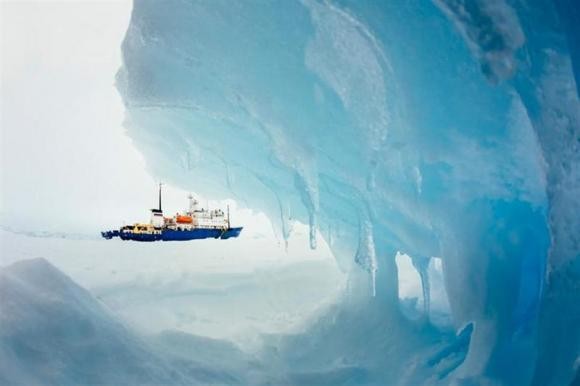
A helicopter, belonging to Chinese icebreaker Snow Dragon, has arrived near the stranded research Russian ship MV Akademik Shokalskiy, bringing renewed hopes to the passengers stuck in dense ice off East Antarctica, since 26 December.
Christ Turney, one of the scientists on board, said in a tweet that the helicopter has finally arrived and it looks certain that the passengers would be airlifted. A video of the helicopter arriving at the scene has also been posted.
The Chinese helicopter has arrived @ the Shokalskiy. It's 100% we're off! A huge thanks to all. http://t.co/UcmHMaO2Gd #spiritofmawson
— Chris Turney (@ProfChrisTurney) January 2, 2014
The first of the helicopters to take us home. Thanks everyone! #spiritofmawson Alok Jha https://t.co/WawL6pQz9J — Chris Turney (@ProfChrisTurney) January 2, 2014
Helicopter flying over to check out helipad. May be leaving in an hour! #spiritofmawson
— Chris Turney (@ProfChrisTurney) January 2, 2014
Meanwhile, Alok Jha, a science correspondent with the Guardian newspaper, has also confirmed the arrival of the helicopter. He has in fact tweeted that first batch of passengers have been taken off and are on their way to the Aurora Australis. Although the passengers in Shokalskiy are likely to be evacuated soon, it is unlikely that the entire plan would be successful on Thursday.
EXCLUSIVE: First picture of Chinese helicopter evacuation of Akademik Shokalskiy via @loztopham for @guardian pic.twitter.com/9WEFChFy0K — Antarctica Live (@GdnAntarctica) January 2, 2014
First passengers from Shoklakiy have taken off, now on their way to Aurora Australis pic.twitter.com/PS4uOndHX4
— Alok Jha (@alokjha) January 2, 2014
The Australian Meritime Safety Authority (AMSA), which is coordinating the rescue efforts, said earlier on Thursday that the rescue operations were likely to commence shortly due to improved weather. But within a matter of hours, the agency issued another statement that ice conditions have foiled the planned rescue operation and it was likely that the rescue would not go ahead as planned on Thursday. It is now understood that only part of the rescue plan would be carried out for the time being.
The plan was to airlift the passengers from Shokalskiy by helicopter and bring them to the Snow Dragon. The scientists and tourists would then be carried in a barge to the nearby Australian vessel Aurora Australis. But for this to be possible, the barge has to first be brought to the Chinese vessel.
AMSA has said that the current sea ice conditions prevent the barge from Aurora Australis from reaching the Snow Dragon, and that the planned rescue would likely fail again.
Additionally, Snow Dragon's helicopter is unable to land on the Aurora Australis because of load-rating restrictions. It is also not safe to land the helicopter next to Aurora Australis at this time.
"This rescue is a complex operation involving a number of steps. Operations in Antarctica are all weather and ice dependent and conditions can change rapidly. The priority is to ensure the safety of all involved," AMSA said in a statement.
"The Rescue Coordination Centre, Australia continues to be in regular contact with all vessels involved and continues to monitor the situation. The vessels involved are also in close contact with each other via VHF radio," it added.














